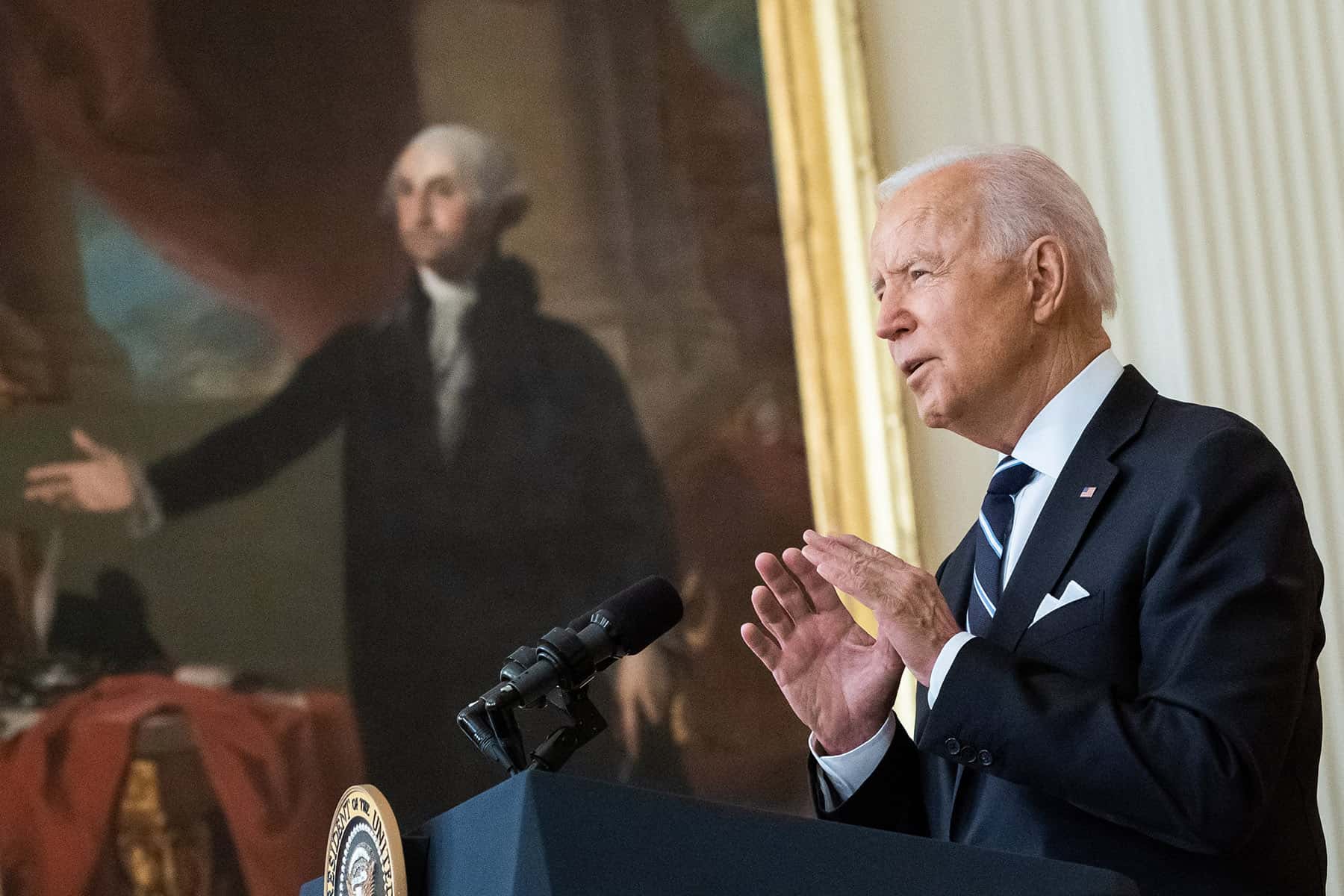
In February 2021, the month after President Joe Biden took office, unemployment was 6.3%, and the nonpartisan Congressional Budget Office projected that it would take until the end of 2023 for the nation to reach 4.6% unemployment.
In March 2021, Congress passed the $1.9 trillion American Rescue Plan to stimulate the economy, which had withered during the coronavirus pandemic. The plan extended unemployment benefits and provided stimulus payments to individuals. It increased food stamp benefits and significantly expanded the Child Tax Credit, putting money in parents’ pockets. It provided grants to small business and local, state, and tribal governments. It provided money for schools, housing, and healthcare.
Not a single Republican voted for the measure.
The Bureau of Labor Statistics released its October monthly jobs report on November 5, and the news was good. The country added 531,000 new jobs, and numbers for previous months were revised to take more complete data into account. They showed that there were 235,000 more jobs created in August and September than had previously been counted. The news says that the U.S. economy has reached 4.6% unemployment two years ahead of schedule.
Since Biden took office, the U.S. has added more than 5.6 million jobs. This reflects the rebound from the lows of the pandemic, and it means that Biden added more jobs in the first 9 months of his presidency than the last three Republican administrations, covering 16 years, combined. The news created a rally on the stock market.
The Dow Jones Industrial Average, the S&P 500, and the Nasdaq Composite, all ways of measuring the stock market, all closed at record highs, a powerful sign in light of the fact that right-wing politicians have insisted that Biden’s policies would hurt the economy.
“Bold fiscal policy works,” Treasury Secretary Janet Yellen wrote on Twitter. “A rebound like this was never a foregone conclusion. When our administration took office back in January, there was a real risk that our economy was going to slip into a prolonged recession. Now our recovery is outpacing other wealthy nations.” She credited the American Rescue Plan and Biden’s immunization campaign, which has vaccinated 193 million Americans against the novel coronavirus, for the recovery.
Turning the obscene right-wing rallying cry “Let’s go, Brandon” on its head, Biden supporters got #ThankYouBrandon trending on Twitter throughout November 5.
The new numbers also show that women are still not reentering the workforce in numbers that reflect the pre-pandemic era. Experts think that the lack of safe childcare and concerns about schools are keeping women out of the workforce. The administration’s Build Back Better infrastructure bill would address these concerns, and after months of complicated negotiations, Biden has put a huge push today to get the House to advance the measure.
The Build Back Better bill is paired with the smaller bipartisan infrastructure measure, and this morning Republicans tried to adjourn Congress rather than allow the Democrats to bring them up. Their efforts failed, and House Democrats negotiated all day as House Speaker Nancy Pelosi tried to hammer down the last details while President Biden put pressure on lawmakers to pass both the bipartisan infrastructure bill and the Build Back Better measure.
Finally, on November 5 at about 11:30 p.m., the House of Representatives passed the $1.2 trillion Infrastructure Investment and Jobs Act (H.R. 3684) by a vote of 228 to 206. Biden promised to pass a bipartisan measure and after nine months of hard work, he did it. Thirteen Republicans voted in favor of the bill, six progressive Democrats voted against it. The measure had already passed the Senate, so now it goes to his desk for a signature.
This bill is a huge investment in infrastructure. Over the next 8 years, it will provide $110 billion for fixing roads and bridges, $73 billion for the electrical grid, $66 billion for railroads, $65 billion for broadband, $55 billion for water infrastructure, $47 billion for coastal adjustments to climate change, $39 billion for public transportation, and so on.
“Regardless of the politics, the passage of a $1.2T bipartisan infrastructure bill is a towering legislative achievement for Biden — and one that Trump never came close to matching.” – Hugo Lowell
As soon as the Democrats in the House of Representatives passed the $1.2 trillion Infrastructure Investment and Jobs Act (H.R. 3684) by a bipartisan vote, Republicans began to say that the Democrats were ushering in “socialism.” When Republicans warn of socialism, they are not talking about actual socialism, which is an economic system in which the means of production, that is, the factories and industries, are owned by the people. In practical terms, that means they are owned by the government.
True socialism has never been popular in America, and virtually no one is talking about it here today. The best it has ever done in a national election was in 1912, when labor organizer Eugene V. Debs, running for president as a Socialist, won a whopping 6% of the vote, coming in behind Woodrow Wilson, Theodore Roosevelt, and William Howard Taft. True socialism isn’t a real threat in America.
What politicians mean when they cry “socialism” in America today is something entirely different. It is a product of the years immediately after the Civil War, when Black men first got the right to vote. Eager to join the free labor system from which they had previously been excluded, these men joined poor white men to vote for leaders who promised to rebuild the South, provide schools and hospitals – as well as desperately needed prosthetics for veterans, and develop the economy with railroads to provide an equal opportunity for all men to work hard and rise.
Former Confederates loathed the idea of Black men voting. But their opposition to Black voting on racial grounds ran headlong into the Fifteenth Amendment to the Constitution, which, after it was ratified in 1870, gave the U.S. government the power to make sure that no state denied any man the right to vote “on account of race, color, or previous condition of servitude.” When white former Confederates nonetheless tried to force their Black neighbors from the polls, Congress in 1870 created the Department of Justice, which began to prosecute the Ku Klux Klan members who had been terrorizing the South.
With racial discrimination now prohibited by the federal government, elite white southerners changed their approach. They insisted that they objected to Black voting not on racial grounds, but because Black men were voting for programs that redistributed wealth from hardworking white people to Black people, since hospitals and roads would cost tax dollars and white people were the only ones with taxable property in the Reconstruction South. Poor Black voters were instituting, one popular magazine wrote, “Socialism in South Carolina.”
This idea that it was dangerous for poor working men to have a say in the government caught on in the North as immigrants moved into growing cities to work in the new factories. Like their counterparts in the South, they voted for roads and schools, and northern men of wealth too insisted these programs meant a redistribution of wealth through tax dollars.
They got more concerned still when a majority of Americans began to call for regulation to keep businessmen from gouging consumers, polluting the environment, and poisoning the food supply – milk was preserved with formaldehyde, and candy was often painted with lead paint. Wealthy men argued that any attempt to regulate business would impinge on a man’s liberty, while an army of bureaucrats to enforce regulations would cost tax dollars and thus would mean a redistribution of wealth from men of means to the poor who would benefit from the regulations.
Long before the Bolshevik Revolution in Russia brought the fears of a workers’ government to life, Americans who opposed regulation insisted that their economy was under siege by socialists. That conviction did indeed lead to a redistribution of wealth, but as regular Americans were kept from voting, it went dramatically upward, not down.
Regulation of business and promotion of infrastructure is not, in fact, the international socialism today’s Republicans claim. According to Abraham Lincoln, who first articulated the principles of the Republican Party, and under whom the party invented the American income tax, the “legitimate object of government, is to do for a community of people, whatever they need to have done, but can not do, at all, or can not, so well do, for themselves – in their separate, and individual capacities.” Those things included, he wrote, “public roads and highways, public schools, charities, pauperism, orphanage, estates of the deceased, and the machinery of government itself.”
Еrіn Scоtt
Letters from an Аmerican is a daily email newsletter written by Heather Cox Richardson, about the history behind today’s politics














